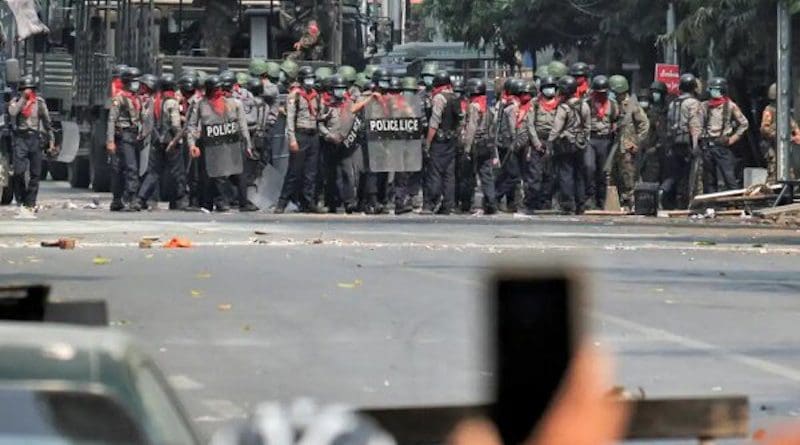Risking Everything To Report On Myanmar’s Military Repression
Journalists and opposition groups in embattled Myanmar are closely watching developments in Ukraine to see what lessons they can apply to their own country’s struggle against antidemocratic military forces, according to panelists in a recent East-West Center online discussion.
Faced with popular resistance to the year-old military coup that prevented the seating of an elected Parliament, Myanmar security forces and their supporters have killed at least 1,600 people and detained more than 12,500, the United Nations human rights office reported last month. While 440,000 people have been uprooted and 14 million urgently need humanitarian aid, help has been largely blocked by the military, which the UN says has committed human rights violations “with impunity.” They called for more international action to put an end to the “profound crisis.”
Democracy frontline
Myanmar, which shares a border with China, is on the frontline of democracy and deserves global attention just as Ukraine does, said Miemie Winn Byrd, East-West Center adjunct fellow on US-Myanmar relations. “If Myanmar does not retain its democracy, it will send a huge message in the Indo-Pacific region,” she said.
.Myanmar journalists on the panel said they continue to provide local coverage despite the threat of arrest, torture, and death. About 115 journalists have been detained in the past year and 14 remain in jail, said Soe Myint, editor-in-chief of Mizzima news. Three journalists have been killed by the military regime, he said.
Mizzima has established multiple offices for the safety of its staff, relocating them to areas beyond the control of the regime’s security forces and across the Thailand border. The military freezes journalists’ bank accounts, monitors their mobile phones, and uses the Internet “as a tool of suppression” by denying access to it, Soe Myint said.
Conditions worsening
Conditions for Myanmar reporters are worsening, agreed Burmese multimedia journalist Cape Diamond (a pen name he uses for safety), who is still working in the country as a freelancer for international outlets. Those who are out in the field passing military checkpoints are subject to searches of their phone and car. Some are threatened on social media.
Diamond said new media outlets that have the backing of the military help spread the regime’s propaganda, labeling independent journalists as traitors.
Prior to the coup, when journalists reported on the military’s genocide of Muslim Rohingya, reporters were unpopular with the people, he said, and viewed as disloyal. Since the takeover, that view has changed, according to Diamond. Journalists are now perceived as reporting the truth about conditions in the country.
“For me personally, I’m very pleased whether I receive praise from the people or am labeled a traitor, because I’m just doing my work. My professionalism is to report the truth,” he said.
Diamond said Myanmar has never had true press freedom, even under the previous government presided over by Nobel Peace Laureate Aung San Suu Kyi. Even then, he said, many journalists were jailed for covering critical stories, including crimes committed by the military.
”Those reporting for local news outlets, including citizen journalists, are the real heroes, he said: “There are many places we are not able to go because of the restrictions and fighting. But these citizen journalists are the ones who are helping us gather information on the ground.”
Failing regime
Soe Myint believes the military regime simply wants the independent journalists dead. But the media’s reach is growing. “In fact, we have been able to publish more news stories and grow our audience, if we compare before and after (the coup),” he said, noting that his organization’s Facebook account has grown from 15 million followers to more than 20 million.
The military regime has been failing since the coup, according to Aung Zaw, editor-in-chief of The Irrawaddy news site. He pointed to a strong resistance, international sanctions against the regime, the falling value of the country’s currency, and growing numbers of slipping into poverty. Power blackouts and departures by doctors and teachers are causing further systemic instability.
Significantly, Winn Byrd said, the military is seeing unprecedented defections and desertions. “When you have that low level of morale, you can’t win wars,” the Myanmar-born retired US military officer observed.
Ukraine similarities
Whether the Myanmar opposition can overcome the military remains an open question. The Washington Post recently described the conflict as a likely stalemate, with similarities to the Russian-Ukrainian war.
It is clear that Ukraine has already impacted events in Myanmar. As a major supplier of weapons to the Myanmar regime, Russia may now be unable to continue its support, Winn Byrd said, reminding viewers that “Russian bombs and bullets are also killing Myanmar people on the ground as well.”
Myanmar opposition forces are watching and learning from Ukraine’s strong resistance to the Russian invasion, she said. Ukraine President Volodymyr Zelenskyy’s effective use of the media in getting his message out to the world has been one lesson.
As with Ukraine, members of Myanmar’s diaspora abroad have mobilized to raise funds and provide technical support to resistance groups. When the regime attempts to track or block communications, technicians from outside the country send instructions on how to skirt the barriers, Winn Byrd said.
Myanmar journalists also need financial support, particularly those who work for the country’s regional and ethnic outlets, said Soe Myint. Additionally, with the military’s shutdown of the Internet, journalists require technical assistance, such as satellite service, to continue their work. Further, he said, if the international media cover the Myanmar conflict more often, the resistance can gain support and encouragement to overcome the military.


Congratulations. It hit the nail on the head. We would like to see more of this kind of Articles
to know the truth about the country/
Regards
Eddie